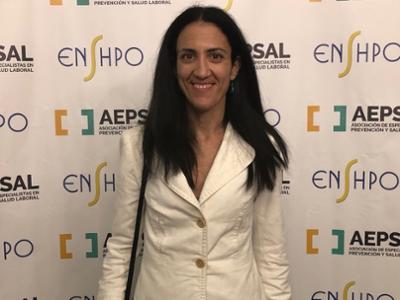

Susana Romero (AEPSAL): “Prevention should take into account factors such as the age, gender and diversity of employees”
Susana Romero, general secretary of AEPSAL, Association of Occupational Health and Safety Specialists, states in the interview below that prevention should be based on the worker, taking into account factors such as age, gender and diversity. In addition, she explains that, in the real integration of OSH into the company, above all in SMEs and micro SMEs, and in sectors such as the primary sector, there is much work to be done.
How has occupational health and safety knowledge evolved in Spain in recent years?
In general, it can be said that the knowledge that the company must protect its workers from exposure to situations or activities in the workplace that could be harmful to their health. In many companies, OSH is a strategic factor and works to actively promote health and wellbeing. But putting in it into practice, achieving the real integration of OSH into the company, above all in SMEs and micro SMEs, and in sectors such as the primary sector... there is a lot of work to be done. Today, we see that we are a long way from achieving it, in the middle of a great global economic, social and environmental crisis with the worst figures for accident rates and absenteeism in recent years and a “hidden pandemic” resulting from the impact of this situation on our mental health.
How has occupational health and safety knowledge evolved in Spain in recent years?
In general, it can be said that the knowledge that the company must protect its workers from exposure to situations or activities in the workplace that could be harmful to their health. In many companies, OSH is a strategic factor and works to actively promote health and wellbeing. But putting in it into practice, achieving the real integration of OSH into the company, above all in SMEs and micro SMEs, and in sectors such as the primary sector... there is a lot of work to be done. Today, we see that we are a long way from achieving it, in the middle of a great global economic, social and environmental crisis with the worst figures for accident rates and absenteeism in recent years and a “hidden pandemic” resulting from the impact of this situation on our mental health.
Speaking of the pandemic, what was the effect of Covid on increasing knowledge and raising awareness of the risks among members of the public?
Three years after Covid-19 first made an appearance into our lives, we find ourselves facing a new society (transformed, further weakened by the severe crisis, and with new needs), which has changed its way of relating, of working and therefore of preventing. Without a doubt, companies have seen how their employees’, collaborators’ health have a direct effect on their business, but if we look at the current data on absenteeism and accident rates, we haven’t learnt much.
2020 left us with a 17% increase in the accident rate and more than a million people who did not go to work for health reasons, not to mention the critical worsening of our mental health (half of the working population have suffered from or are currently suffering from anxiety or depression due to their work). Although there is a large number of sectors and companies that are promoting their workers’ health and safety, we continue to be buried in a culture of compliance, where we are undertaking reactive rather than pro-active prevention.
With regard to the sector in Spain, occupational health and safety specialists have evolved and new responsibilities have been assigned to us. But society has already forgotten that in part, as has happened in the social care and healthcare sector. We are experiencing an increase in resignations from OSH professionals, due to the high workload, worsening working conditions and accumulated burnout, among other factors.
What is the importance of research and dissemination for improving risk prevention.
Without a doubt it is very important. Work and workplaces are subject to continuous change through the introduction of new technologies, chemicals and work processes, through changes in the structure of the labour force and the labour market, and through new forms of employment and work organisation. Important changes, which are developing at great speed, for which we need a working population that will have to learn to work with intelligent machines, in which different ages with different needs coexist (given the ageing of the working population) and to which labour regulations and working methodologies in the area of occupational health and safety should respond in the same timeframe.
All this requires a firm commitment to invest in active preventive policies at the private and institutional level, to raise awareness of the consequences of not carrying out prevention and of its benefits, making use, why not, of the media and new forms of communication to reach everyone. To this end AEPSAL is participating not only in technical workshops, but also with the press and radio to bring the message to society as a whole.
Faced with this scenario, AEPSAL calls for worker-centred prevention that takes into account factors such as age, gender and diversity. We cannot talk about protecting health and safety while there is precariousness, inequality, irregular hiring; while there is no preventive culture and the average employer considers prevention as just another "tax". We need political and institutional commitment to work together for social change which begins with improving working conditions: What level of preventive awareness does the company that sustains its profits with precarious contracts have? How is a worker going to listen to an OHS talk that they are "forced to attend because the client asks for it" when he works in fear?
Three years after Covid-19 first made an appearance into our lives, we find ourselves facing a new society (transformed, further weakened by the severe crisis, and with new needs), which has changed its way of relating, of working and therefore of preventing. Without a doubt, companies have seen how their employees’, collaborators’ health have a direct effect on their business, but if we look at the current data on absenteeism and accident rates, we haven’t learnt much.
2020 left us with a 17% increase in the accident rate and more than a million people who did not go to work for health reasons, not to mention the critical worsening of our mental health (half of the working population have suffered from or are currently suffering from anxiety or depression due to their work). Although there is a large number of sectors and companies that are promoting their workers’ health and safety, we continue to be buried in a culture of compliance, where we are undertaking reactive rather than pro-active prevention.
With regard to the sector in Spain, occupational health and safety specialists have evolved and new responsibilities have been assigned to us. But society has already forgotten that in part, as has happened in the social care and healthcare sector. We are experiencing an increase in resignations from OSH professionals, due to the high workload, worsening working conditions and accumulated burnout, among other factors.
What is the importance of research and dissemination for improving risk prevention.
Without a doubt it is very important. Work and workplaces are subject to continuous change through the introduction of new technologies, chemicals and work processes, through changes in the structure of the labour force and the labour market, and through new forms of employment and work organisation. Important changes, which are developing at great speed, for which we need a working population that will have to learn to work with intelligent machines, in which different ages with different needs coexist (given the ageing of the working population) and to which labour regulations and working methodologies in the area of occupational health and safety should respond in the same timeframe.
All this requires a firm commitment to invest in active preventive policies at the private and institutional level, to raise awareness of the consequences of not carrying out prevention and of its benefits, making use, why not, of the media and new forms of communication to reach everyone. To this end AEPSAL is participating not only in technical workshops, but also with the press and radio to bring the message to society as a whole.
Faced with this scenario, AEPSAL calls for worker-centred prevention that takes into account factors such as age, gender and diversity. We cannot talk about protecting health and safety while there is precariousness, inequality, irregular hiring; while there is no preventive culture and the average employer considers prevention as just another "tax". We need political and institutional commitment to work together for social change which begins with improving working conditions: What level of preventive awareness does the company that sustains its profits with precarious contracts have? How is a worker going to listen to an OHS talk that they are "forced to attend because the client asks for it" when he works in fear?





